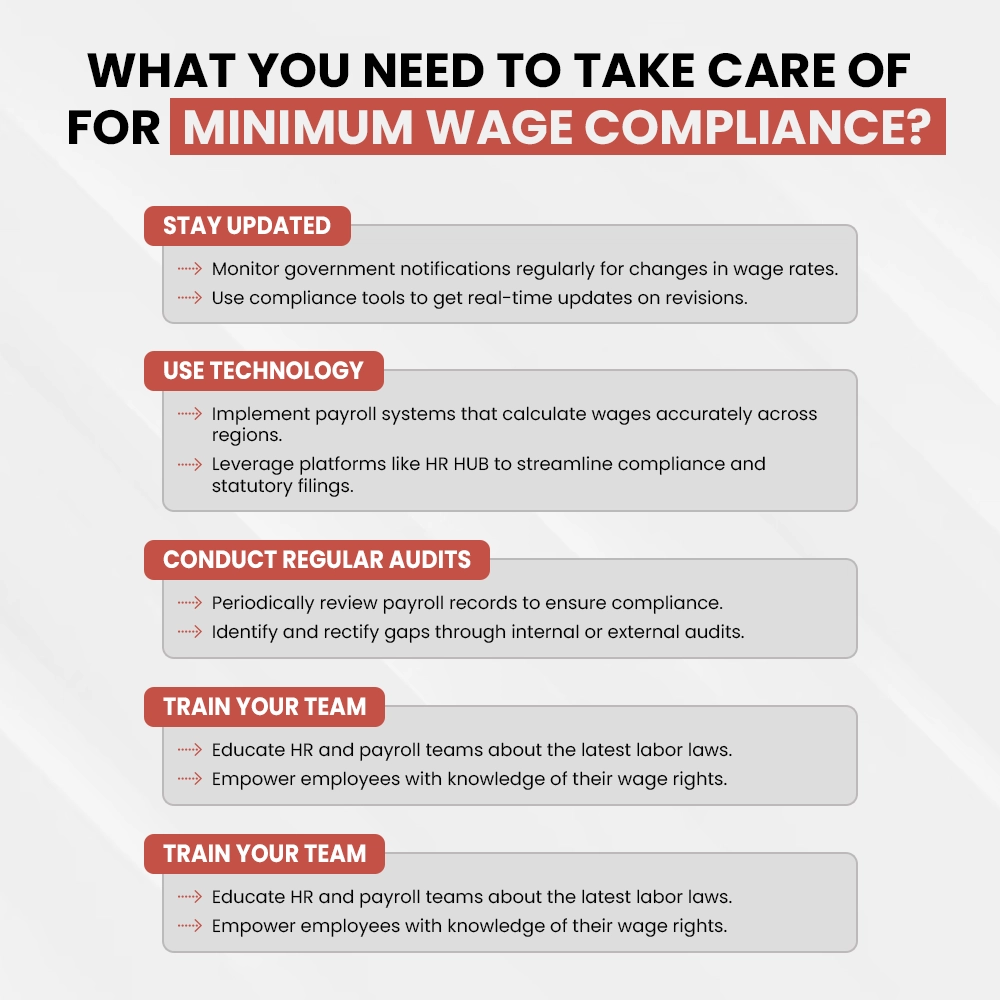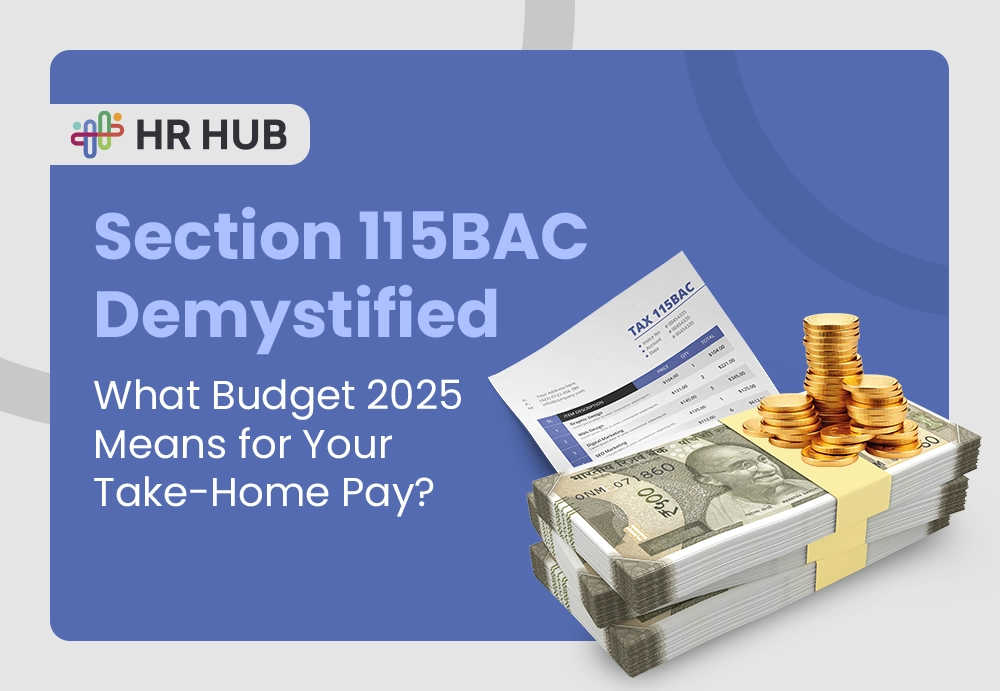Ensuring fair compensation to employees has always been a major concern in a dynamic economy like India. For businesses, it is no less than a challenge to navigate the complex landscape of wage regulations.
Employers have key questions like,
- What is the minimum wage in India?
- How do we adapt to the changing government labor rate per day?
In today's times, failure to comply may attract serious punishments, damage reputation, and create unpleasant employee relations. Therefore, this compliance with minimum wages in India must become a very current affair.
This blog details challenges while complying with minimum wages as per the law in India and presents actionable best practices for smooth compliance in 2024.
Understanding The Concept of Minimum Wages in India
The minimum wages in India are regulated under the Minimum Wages Act 1948 to prevent workforce exploitation. Therefore, employers are bound to ensure that their employees receive, at the least, the minimum salary in India as the government decides.
These wages vary based on:
- Industry and Occupation: Different sectors and roles have unique wage thresholds.
- Region: The cost of living differs across states, influencing wage rates.
- Skill Level: Workers are categorized into unskilled, semi-skilled, skilled, and highly skilled groups.
Additionally, the central minimum wages apply to industries under central jurisdiction, while states regulate wages for local sectors. The government labour rate per day is periodically revised to account for inflation and economic changes.
Challenges Employers Face in Minimum Wage Compliance
Let's highlight the key challenged that employers really face related to having minimum wage compliance, especiall in India.
1. Complex Wage Structures and Regional Variations
India’s minimum wage system is notoriously intricate. With different rates for states, industries, and job roles, businesses operating across multiple regions often struggle to keep track of updates.
For instance, the minimum salary in India for a factory worker in Maharashtra might differ significantly from that in Bihar.
2. Frequent Revisions
Minimum wages are revised periodically, often with short notice. In 2024, central and state governments announced several hikes to the government labour rate per day, aiming to combat inflation.
Staying updated and adjusting payroll systems promptly can be resource-intensive for employers.
3. Lack of Clarity on Enforcement
While the law mandates compliance, enforcement mechanisms vary. In the informal sector, many workers still earn below the prescribed wages due to weak monitoring.
4. Transition to a Living Wage Framework
India plans to transition from minimum wages to a living wage model by 2025. This shift introduces new complexities, as employers must adjust compensation structures and financial planning to accommodate higher wages.
5. Administrative and Record-Keeping Burden
Maintain accurate records of wages, working hours, and any statutory deductions for inspection purposes. Non-compliance, including in such circumstances as administrative errors, attracts penalties.
6. Vendor and Contractor Management
Businesses relying on third-party contractors face an additional challenge of ensuring their compliance with minimum wage laws. Any lapse by contractors can impact the principal employer’s reputation and legal standing.
Do You Know What?India does not have a uniform national minimum wage; instead, it varies by state and employment sector. This is because the Indian Constitution allows both Central and State governments to set minimum wages for the workers under their respective jurisdictions.
Best Practices for Employers in 2024
The employers must adopt the best practices mentioned below to deal with wage compliance.
1. Stay Updated on Wage Notifications
Given the frequent updates to minimum wages in India, employers should:
Regularly monitor government notifications for changes in the government labour rate per day.
Subscribe to compliance tracking tools or services that provide real-time updates.
2. Leverage Technology for Compliance
Implement robust payroll management systems to automate wage calculations, factoring in regional variations and revisions.
Use platforms like HR HUB, which streamline compliance management & tracking, payroll processing, and statutory reporting, reducing the risk of errors.
3. Conduct Regular Wage Audits
Periodically review payroll records to ensure all employees receive at least the minimum salary in India.
Engage external auditors to identify gaps and rectify compliance issues.
4. Classify Employees Correctly
Accurate classification of employees based on their roles and skills (unskilled, semi-skilled, skilled) is crucial. Misclassification can result in underpayment and legal consequences.
5. Strengthen Vendor and Contractor Agreements
Include compliance clauses in vendor contracts, holding them accountable for meeting central minimum wages and state-specific requirements.
Conduct periodic audits of vendor payroll systems to mitigate risks.
6. Prepare for the Living Wage Transition
Start planning for the upcoming living wage framework by reviewing existing compensation structures.
Collaborate with finance teams to forecast budgetary impacts and align business strategies accordingly.
7. Train HR and Payroll Teams
Organize training programs to educate teams about the latest wage laws and compliance protocols.
Empower employees with knowledge about their rights under minimum wage regulations, fostering trust and transparency.
8. Focus on Documentation
Keeping detailed records of remunerations paid, working hours, and legal deductions to prove compliance when it's demanded during inspection.
Such accounts must be accessible and current.
9. Adopt a Proactive Approach
To avert judicial litigations, adequate redress of wage discrepancy disputes and employee complaints must be provided.
Monitor legal consultants on changes in rules and regulations in advance for potential minimum compliance risks.

The Role of HR HUB in Simplifying Compliance
Tools like HR HUB can be a game-changer for employers in the ever-changing landscape of wage compliance. By automating payroll calculations, tracking wage revisions, and ensuring statutory filings are completed on time, HR HUB helps businesses stay compliant without administrative hassle. The centralized platform makes multi-state operations easier to manage, tracks vendor compliance, and allows for legal updates.
Navigating Minimum Wage Compliance in 2024 and Beyond
Complying with India's minimum wage requirements is not merely an issue of avoiding penalties; it is actually about creating a fair and equitable work environment. While the country transitions towards a living wage framework, business houses must prepare to stay compliant without hindering operational efficiency.
Staying informed, technology leverage, and best practice adoption can help employers navigate challenges and build resilient, future-ready workforces. Solutions like HR HUB make compliance easier to achieve than ever.





